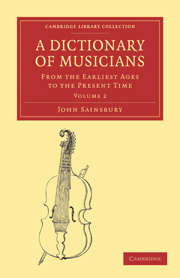Summary
QUADRIO, (Francesco Xavverio) an Italian Jesuit, is the author of a work which appeared at Bologna and Milan from 1739 to 1746, in four volumes quarto, entitled “Della Storia e della Ragione d'Ogni Poesia.” In this book are to be found many articles relating to musical literature; amongst others, remarks on the musical merits of Guy d'Arezzo, on the cantata, on the opera, and on the oratorio.
QUAGLIA, (Giovanni Battista) an Italian musician of the seventeenth century. Amongst the Motetti Sacri à Voce sola con Instr. published at Bologna in 1695, is to be found a motet of Quaglia's composition, “Quis splendor, quce lux,” for a Soprano voice, with instruments.
QUAGLIATI, (Paola) a celebrated contrapuntist of Rome, flourished about the year 1600. He was one of the first masters who relinquished the pedantry of canons, fugues, and other gothic inventions; and, in imitation of the ancient Greeks, aspired only at expression, grace, and propriety. “Quagliati was a professor of the harpsichord and an excellent chapel-master,” says Della Valle, who was his pupil; “he introduced a new species of music into the churches of Rome, not only in compositions for a single voice, (monodie) but for two, three, four, and very often more, voices in chorus, ending with a numerous crowd of many choirs, or choruses, singing together; specimens of which may seen in many of his motets, that have been since printed.
- Type
- Chapter
- Information
- Publisher: Cambridge University PressPrint publication year: 2009First published in: 1824



